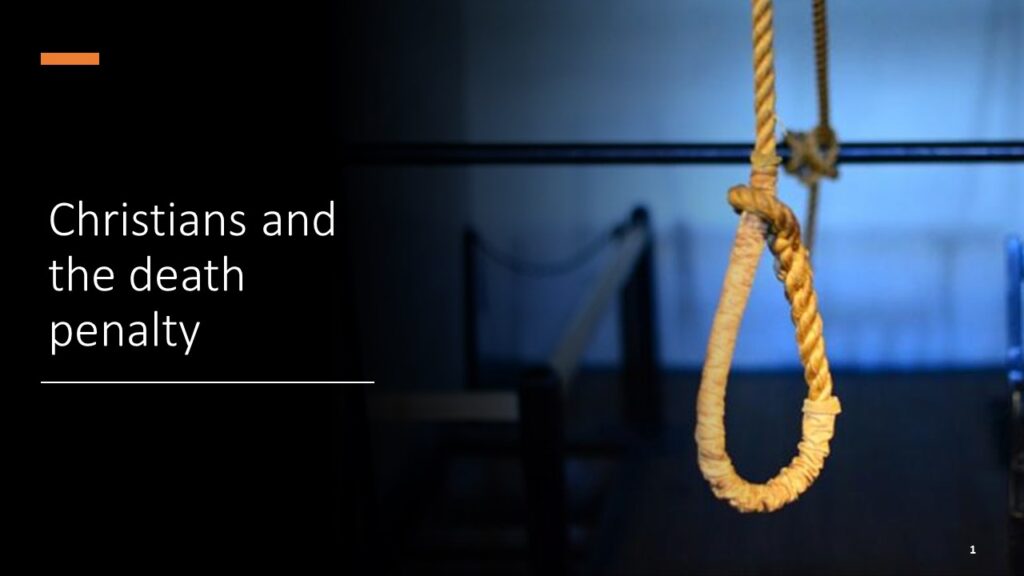I ended my article about the talk I gave to BLC youth by noting that I presented 3 views about capital punishment. My purpose in that article was to reveal the back story to my talk.
What I said about the content of my talk was incidental, just background to my struggle over accepting the invitation.
Some readers asked for more about the content of my talk. On the BLC Facebook page, I shared the slides I used, and promised to write a response.
Concurrently, Davin asked if I’d like to read an academic paper he wrote about the death penalty. Of course, I said yes!
I enjoyed his paper. We approach the subject differently. We differ in our assessment of one claim about the biblical teaching. Yet we both reject the death penalty.
Davin will adapt his material to suit this platform. I look forward to publishing it, perhaps in two instalments.
I’ll not steal Davin’s thunder. I won’t say how his approach is different and where we differ. To keep it short, I’ll just tell you a dozen things I said.
One, those who are punished are human, as are those who conduct the physical executions. The effects on executioners are often overlooked.
Two, countries around the world have ceased using the death penalty, either through changing their laws or choosing not to apply them.
Three, the country which executes the greatest number of people is China. The only ‘Western’ country which still executes people is the USA. Other countries in the top ten are Muslim majority countries.
Four, clergy (persons ordained into ministries by churches) are more likely than laypersons to support capital punishment.
Five, some denominations, like the Lutheran Church in Malaysia, do not formally support or reject the death penalty.
Six, the Catholic church has officially renounced the death penalty. But the Catholic church in Singapore has rejected the papal renunciation. Some Protestants oppose the death penalty, others defend it.
Seven, a study commissioned in Malaysia by an British professor showed that Muslims are more likely to support the death penalty. It found that many support the death penalty, even for drug offences. Often, the executed are poor, had weak legal representation and may have been forced to confess.
Eight, Pakatan Harapan’s 2018 Election Manifesto promised to end the death penalty. When they took office, they tried to change the law. When many objected, they chose to abandon their promise.
Nine, in the first 3 centuries, Christians were a minority and were often executed for refusing to worship Caesar. During this period, most Christian theologians rejected the death penalty.
Ten, when Constantine was emperor (died 337 AD), Christians took over the reins of power. Then they supported the death the penalty, even for crimes other than murder. They executed heretics, those who didn’t support church teachings – including people who rejected infant baptism.
Eleven, During the reformation in the 16th century (birth period of Protestantism), Luther did not support execution of heretics. Calvin did.
Twelve, Christians differ over how to interpret related biblical texts and events. I’ll list just seven:
Genesis 9:6 Whoever sheds the blood of man, by man shall his blood be shed, for God made man in his own image.
Romans 13:4 for [the ruler is] God’s servant for your good. … he does not bear the sword in vain. … he is the servant of God, an avenger who carries out God’s wrath on the wrongdoer.
Hebrews 9:14 how much more will the blood of Christ, who through the eternal Spirit offered himself without blemish to God, purify our conscience from dead works to serve the living God.
Leviticus 20 which specifies death as punishment for parents who offer their child as sacrifice to Molech, for children who curse their parents, for those who commit prohibited sex, for those who consult mediums.
Numbers 35:33-34 … no atonement can be made for the land for the blood that is shed in it, except by the blood of the one who shed it … You shall not defile the land in which you live, in the midst of which I dwell, for I the Lord dwell in the midst of the people of Israel.
John 8:1-11 Jesus rejected death for the woman caught in adultery.
Cain, Moses and David committed murder, but were not executed.
Davin notes the ‘sudden death’ of Ananias and Sapphira, after they lied to the church about the selling price of their property (Acts 5:1-11). This is important to the discussion.
Consideration of the above – and much else – leads to 3 views: scripture mandates, prohibits, or permits the death penalty.
What’s your view? Can you defend it using a biblical framework?
Do watch Amnesty International’s short video “Death penalty and executions in 2020.” And read the comments.
To learn more about Rama, click here.


